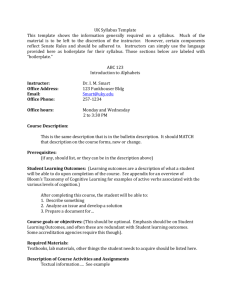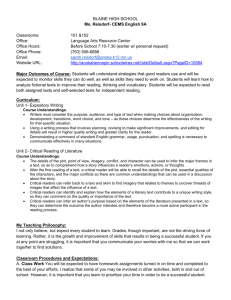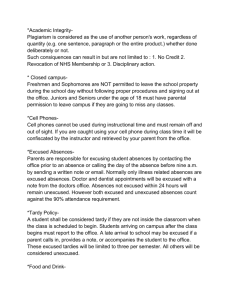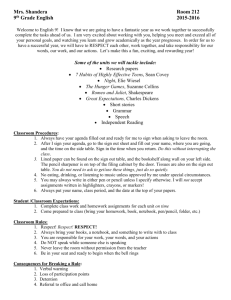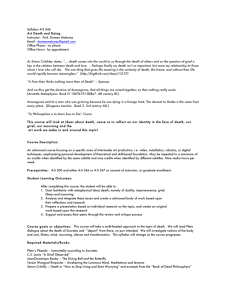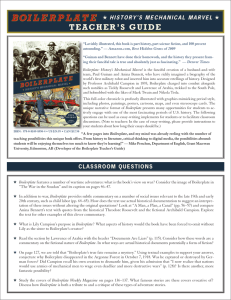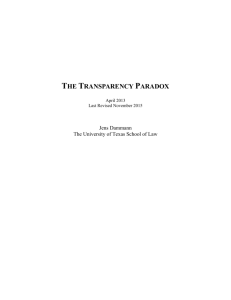UK Syllabus Template (doc)
advertisement
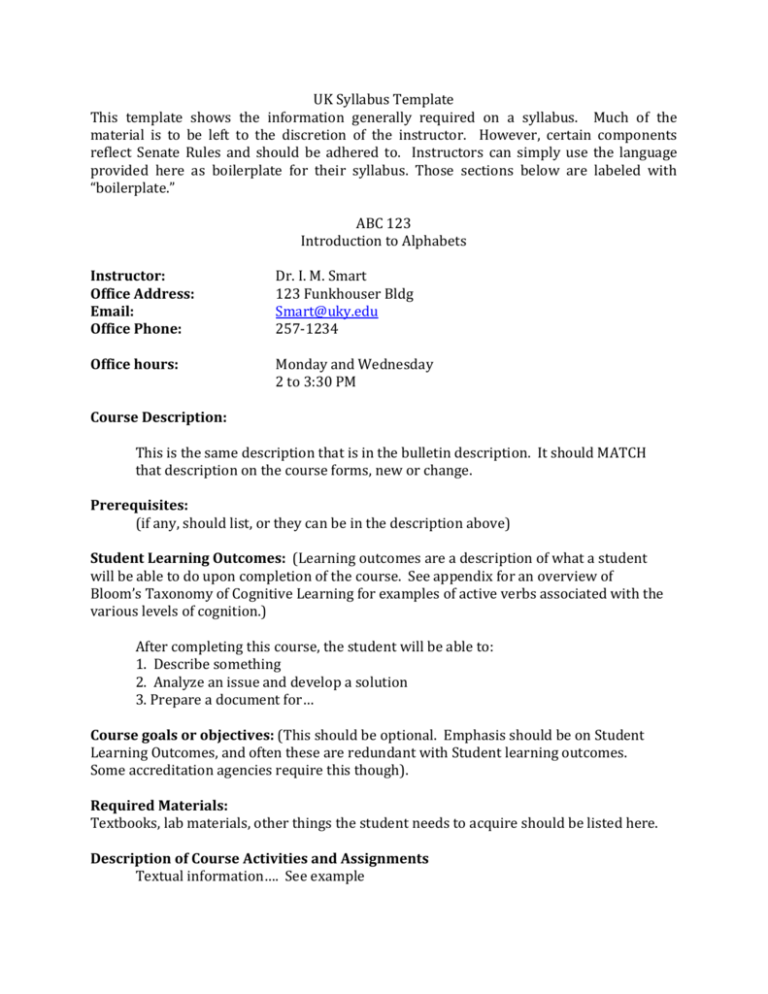
UK Syllabus Template This template shows the information generally required on a syllabus. Much of the material is to be left to the discretion of the instructor. However, certain components reflect Senate Rules and should be adhered to. Instructors can simply use the language provided here as boilerplate for their syllabus. Those sections below are labeled with “boilerplate.” ABC 123 Introduction to Alphabets Instructor: Office Address: Email: Office Phone: Dr. I. M. Smart 123 Funkhouser Bldg Smart@uky.edu 257-1234 Office hours: Monday and Wednesday 2 to 3:30 PM Course Description: This is the same description that is in the bulletin description. It should MATCH that description on the course forms, new or change. Prerequisites: (if any, should list, or they can be in the description above) Student Learning Outcomes: (Learning outcomes are a description of what a student will be able to do upon completion of the course. See appendix for an overview of Bloom’s Taxonomy of Cognitive Learning for examples of active verbs associated with the various levels of cognition.) After completing this course, the student will be able to: 1. Describe something 2. Analyze an issue and develop a solution 3. Prepare a document for… Course goals or objectives: (This should be optional. Emphasis should be on Student Learning Outcomes, and often these are redundant with Student learning outcomes. Some accreditation agencies require this though). Required Materials: Textbooks, lab materials, other things the student needs to acquire should be listed here. Description of Course Activities and Assignments Textual information…. See example Course Assignments Here, should be a listing of required assignments for the grade 3 Exams at 100 points each 6 graded homeworks at 15 points each 1 group paper and presentation at 100 points Etc… Summary Description of Course Assignments Provide a short summary of the different components of your assignments. For example, a short description of exams, assignments, etc… Students should be able to determine what they will be required to do from this. Also, if this is a 400G or 500 level course, please describe what will be required differently for Graduate Students from Undergraduate Students. Course Grading (if 4xxG or 5xx, must have a grade scale for grad and ugrad students. There must also be differentiated expectations for UG and Grad, in addition to a differentiated grading scale, such as a longer research paper, an independent project, etc) Expectations for graduate students beyond the expectations for undergraduates (400G and 500 courses only) Grading scale for undergraduates: 90 – 100% = A 80-89% = B etc.. Grading scale for graduate students (no D for Grad Students): 90-100% = A 82 – 89% = B etc. Final Exam Information Date, time, location, other information Mid-term Grade (for 100-400 level courses, and for undergraduates in 500 level courses) Mid-term grades will be posted in myUK by the deadline established in the Academic Calendar (http://www.uky.edu/Registrar/AcademicCalendar.htm) Course Policies: Submission of Assignments: Describe expectations for assignment submissions. Paper vs online. Late penalties, other requirements. Attendance Policy. Clearly spell out attendance policies for the course, in accordance with Senate Policy on excused absences. Excused Absences (boilerplate): Students need to notify the professor of absences prior to class when possible. S.R. 5.2.4.2 defines the following as acceptable reasons for excused absences: (a) serious illness, (b) illness or death of family member, (c) University-related trips, (d) major religious holidays, and (e) other circumstances found to fit “reasonable cause for nonattendance” by the professor. Students anticipating an absence for a major religious holiday are responsible for notifying the instructor in writing of anticipated absences due to their observance of such holidays no later than the last day in the semester to add a class. Information regarding dates of major religious holidays may be obtained through the religious liaison, Mr. Jake Karnes (859-257-2754). Students are expected to withdraw from the class if more than 20% of the classes scheduled for the semester are missed (excused or unexcused) per university policy. Verification of Absences (boilerplate) Students may be asked to verify their absences in order for them to be considered excused. Senate Rule 5.2.4.2 states that faculty have the right to request “appropriate verification” when students claim an excused absence because of illness or death in the family. Appropriate notification of absences due to university-related trips is required prior to the absence. Academic Integrity (boilerplate): Per university policy, students shall not plagiarize, cheat, or falsify or misuse academic records. Students are expected to adhere to University policy on cheating and plagiarism in all courses. The minimum penalty for a first offense is a zero on the assignment on which the offense occurred. If the offense is considered severe or the student has other academic offenses on their record, more serious penalties, up to suspension from the university may be imposed. Plagiarism and cheating are serious breaches of academic conduct. Each student is advised to become familiar with the various forms of academic dishonesty as explained in the Code of Student Rights and Responsibilities. Complete information can be found at the following website: http://www.uky.edu/Ombud. A plea of ignorance is not acceptable as a defense against the charge of academic dishonesty. It is important that you review this information as all ideas borrowed from others need to be properly credited. Part II of Student Rights and Responsibilities (available online http://www.uky.edu/StudentAffairs/Code/part2.html) states that all academic work, written or otherwise, submitted by students to their instructors or other academic supervisors, is expected to be the result of their own thought, research, or self-expression. In cases where students feel unsure about the question of plagiarism involving their own work, they are obliged to consult their instructors on the matter before submission. When students submit work purporting to be their own, but which in any way borrows ideas, organization, wording or anything else from another source without appropriate acknowledgement of the fact, the students are guilty of plagiarism. Plagiarism includes reproducing someone else’s work, whether it be a published article, chapter of a book, a paper from a friend or some file, or something similar to this. Plagiarism also includes the practice of employing or allowing another person to alter or revise the work which a student submits as his/her own, whoever that other person may be. Students may discuss assignments among themselves or with an instructor or tutor, but when the actual work is done, it must be done by the student, and the student alone. When a student’s assignment involves research in outside sources of information, the student must carefully acknowledge exactly what, where and how he/she employed them. If the words of someone else are used, the student must put quotation marks around the passage in question and add an appropriate indication of its origin. Making simple changes while leaving the organization, content and phraseology intact is plagiaristic. However, nothing in these Rules shall apply to those ideas which are so generally and freely circulated as to be a part of the public domain (Section 6.3.1). Please note: Any assignment you turn in may be submitted to an electronic database to check for plagiarism. Accommodations due to disability (boilerplate): If you have a documented disability that requires academic accommodations, please see me as soon as possible during scheduled office hours. In order to receive accommodations in this course, you must provide me with a Letter of Accommodation from the Disability Resource Center (Room 2, Alumni Gym, 2572754, email address: jkarnes@email.uky.edu) for coordination of campus disability services available to students with disabilities. Classroom Behavior Policies (optional) Describe any policies that you enforce in your classroom, e.g., no cellphones, guidelines for respectful dialogue, etc.. Other Policies (optional) You may wish to list College or major specific information here. Tentative Course Schedule A linear listing of topics, assignment due dates, and examination dates. Other Information (optional) Faculty may wish to list required readings or other information here that is referenced in earlier sections. APPENDIX Bloom’s Taxonomy of Cognitive Learning As instructors, we should strive to push students from Knowledge to Synthesis and Evaluation. It is not enough for students to demonstrate Knowledge or Comprehension. They should also be able to demonstrate that they can use this knowledge in higher order thinking and problem solving. As you construct Student Learning Outcomes, think about the active verbs you are using. What do you expect your students to be able to do? Do you want them to be able to list or describe some facts? Or do you want them to be able to design an experiment or critically analyze data and make a recommendation utilizing those facts? Competence Skills Demonstrated and Action Verbs for Learning Outcomes Skills: observation and recall of information; knowledge of dates, events, places; knowledge of major ideas; mastery of subject matter Knowledge Comprehension Action Verbs: list, define, tell, describe, identify, show, label, collect, examine, tabulate, quote, name, who, when, where, etc… Skills: understanding information; grasp meaning; translate knowledge into new context; interpret facts, compare, contrast; order, group, infer causes; predict consequences Action Verbs: summarize, describe, interpret, contrast, predict, associate, distinguish, estimate, differentiate, discuss, extend Skills: use information; use methods, concepts, theories in new situations; solve problems using required skills or knowledge Application Action Verbs: apply, demonstrate, calculate, complete, illustrate, show, solve, examine, modify, relate, change, classify, experiment, discover Skills: seeing patterns; organization of parts; recognition of hidden meanings; identification of components Analysis Action Verbs: analyze, separate, order, explain, connect, classify, arrange, divide, compare, select, explain, infer Skills: use old ideas to create new ones; generalize from given facts; relate knowledge from several areas; predict, draw conclusions Synthesis Evaluation Action Verbs: combine, integrate, modify, rearrange, substitute, plan, create, design, invent, what if?, compose, formulate, prepare, generalize, rewrite Skills: compare and discriminate between ideas; assess value of theories, presentations; make choices based on reasoned argument; verify value of evidence; recognize subjectivity Action Verbs: assess, decide, rank, grade, test, measure, recommend, convince, select, judge, explain, discriminate, support, conclude, compare, summarize Bloom B. S. (1956). Taxonomy of Educational Objectives, Handbook I: The Cognitive Domain. New York: David McKay Co Inc.
